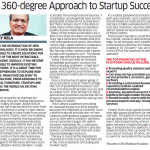WITH THE INTRODUCTION OF NEW TECHNOLOGIES, IT IS NOW BECOMING POSSIBLE TO CREATE SOLUTIONS FOR SOME OF THE MOST INTRACTABLE PROBLEMS. EQUALLY, IT HAS BECOME POSSIBLE TO IMPROVE EXISTING SOLUTIONS. IT IS A GREAT TIME FOR ENTREPRENEURS TO EXPLORE NEW IDEAS. FROM FOOD DELIVERY TO AGRICULTURE, FROM AEROSPACE TO RENTAL FURNITURE, STARTUPS ARE GIVING THE WORLD AN EXCITING MAKEOVER.
But just as quickly as startups are sprouting, they are finding themselves in the Valley of Death. About 80% of startups fail to go beyond the seed-fund stage. And there is a one-in-two chance of them failing to raise funds from series A to series B. Clearly, most are fumbling, despite governments shoring up their efforts to support entrepreneurship. Is there a sensible lifeline that can be thrown to improve the survival rate of startups? In fact, much can be done to propel entrepreneurs and to take their ideas and turn them into businesses.
Naturally, a support eco-system has emerged to fill the need. We have startup incubators and accelerators, ready to steady the entrepreneurial journey. Y Combinator and AngelPad have set the global gold standards for accelerators. But there remains much to be done in India: None of the Indian accelerators qualify to even make the bronze cut.
Many of the Indian accelerators are a little more than providers of real estate. They have innovative models that provide affordable work space, discussion rooms, high-speed internet, computers, printers and administrative services. But having coffee roasters and a game lounge aren’t going to cut it. The needs of new-age startups go beyond this.
Today’s startups need on-demand knowledge and expert connects for their everyday problems—a high tech watering and fertiliser source, so to speak, which ignites and refines ideas and eliminates multitudes of everyday hurdles.
Once a startup has its game going, it faces questions such as “how to bridge the cost of growing the business” and “how to market with greater success and at a lower cost”. Poor answers to these (and similar questions) can be barriers to progress and could push the startup into the Valley of Death.
This is where a platform providing on-demand access to critical insights becomes the lifeblood of a startup. Such a platform would provide one-on-one connects with genuine support systems such as their peers, mentors, advisors, service providers (legal, HR, administrative, marketing, etc.), customers, investors, and global partners and also deliver customised and relevant videobased knowledge resources.
The key is to put all the ingredients required to create success, and then stir in the critical elements of funding and market reach.
In a rapidly globalised economy and with open markets, such a platform should ideally be replicated to support startups in high unemployment countries and, therefore, have the ability to attract powerful board members in each of these nations.
These board members could bring in the capital, connects and local knowledge. As an end goal, such a platform could measure itself by the impact it creates in 10-20 years —say, an increase in the GDP of the countries in which it operates.
THE TOP PRIORITIES OF THE PLATFORM SHOULD INCLUDE:
> Providing quality mentors and experts
> Carrying startup essentials such as service providers, investors, global partners
> Providing a customised knowledge repository with AI-enabled recommendation engine
> Anytime, anywhere access to the platform through mobile-first design
> Should be open-source with lots of pro bono experts and pay-forward services
Clearly, there is an upside to building a new-age support platform for new-age startups. The platform must be broad and go deep into the needs of entrepreneurs. Most importantly, when it propagates network creation through technology, it should have the ability to create a powerful entity that can boost the success rate of startups 10 times. And that is a win for everyone in the system.
Dr. Ajay Kela: The author is CEO of Wadhwani Foundation

